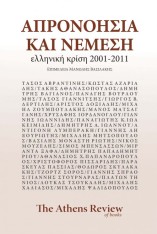Transparency International, (2012), Corruption Perceptions Index 2012, Berlin.
Greece: Quo vadis?
Darvas, Zsolt, (2011), ‘Greece: Quo vadis?’, www.bruegel.org, 17 Σεπτεμβρίου. German Vice-Chancellor and Economics Minister Philipp Rösler broke a long period of silence about a possible Greek default by saying that all ptions are to be considered.Several finance ministries in the eurozone started to assess its implications. The ‘troika’ — the delegation composed of the IMF, European Commission and European Central Bank officials — has recently left Athens without an agreement. …Read More
The European Central Bank’s New Bond-Buying Program: Implications for Italy
Lombardi, Domenico, (2012), ‘The European Central Bank’s New Bond-Buying Program: Implications for Italy’, www.brookings.edu, 11 Σεπτεμβρίου. Τoday’s meeting between Greek Prime Minister Antonis Samaras and European Central Bank President Mario Draghi is a further sign of the increasingly important role of the Eurotower in dealing with the crisis in Europe.
Απρονοησία και Νέμεση: ελληνική κρίση 2001-2011
Βασιλάκης, Μανώλης (επιμ), (2012), Απρονοησία και Νέμεση: ελληνική κρίση 2001-2011, Αθήνα, Athens Review of Books. Η ελληνική κρίση μέσα από τις σελίδες της Athens Review of Books. 45 δοκίμια από 33 γνωστούς επιστήμονες για τη δεκαετία 2001-2011 της κίβδηλης ευμάρειας, όπου μεσουράνησε ο οίστρος της ακολασίας. «Ακολασίας» με όλες τις σημασίες της λέξης, δηλαδή τόσο την ατιμώρητη διασπάθιση των ευρωπαϊκών κονδυλίων και των δανείων, του δημόσιου πλούτου, όσο και την …Read More
Το κοινωνικό πορτραίτο της Ελλάδας-Όψεις της κρίσης
ΕΚΚΕ, (2012), Το κοινωνικό πορτραίτο της Ελλάδας-Όψεις της κρίσης, Αθήνα.
Intra-euro rebalancing is inevitable but insufficient
Darvas, Zsolt, (2012), ‘Intra-euro rebalancing is inevitable but insufficient’, www.bruegel.org, 5 Σεπτεμβρίου. Greece, Portugal and Spain face a serious risk of external solvency due to their close to minus 100 percent of GDP net negative international investment positions, which are largely composed of debt. The perceived inability of these countries to rebalance their external positions is a major root of the euro crisis.
External Imbalances in the Euro Area
IMF (2012), ‘External Imbalances in the Euro Area’, European and Western Hemisphere Departments, IMF Working Papers, N. 12/36. The paper examines the extent to which current account imbalances of euro area countries are related to intra-euro area factors and to external trade shocks. We argue that the traditional explanations for the rising imbalances are correct, but are incomplete. We uncover a large impact of declines in export competitiveness and asymmetric …Read More
The EMU Crisis is a Battle of Nationalism Versus Transnationalism, not Economic Prescriptions
Menenberg, Aaron, (2012), ‘The EMU Crisis is a Battle of Nationalism Versus Transnationalism, not Economic Prescriptions’, www.economonitor.com, 30 Αυγούστου. The debate over how to save the euro and the economy of its union has taken shape around economic prescriptions. On the surface this makes sense; after all, the euro is the currency for seventeen national economies.
Why a breakup of the Euro Area Must be Avoided: Lessons from Previous Breakups
Aslund Anders, (2012), ‘Why a breakup of the Euro Area Must be Avoided: Lessons from Previous Breakups’, www.iie.com, 22 Αυγούστου. One of the big questions of our time is whether the Economic and Monetary Union (EMU) will survive. Too often, analysts discuss a possible departure of one or several countries from the euro area as little more than a devaluation, but Åslund argues that any country’s exit from the euro …Read More
Argentina and Greece: More similarities than differences in the initial conditions
Kiguel, Miguel, (2011) ‘Argentina and Greece: More similarities than differences in the initial conditions’, www.voxeu.org, 17 Αυγούστου. A decade ago Argentina was in the midst of a severe economic crisis. This column argues that the episode offers lessons for the Eurozone today. Unless Greece takes major steps to improve its competitiveness and growth prospects, the country has little hope to get out of this crisis.





